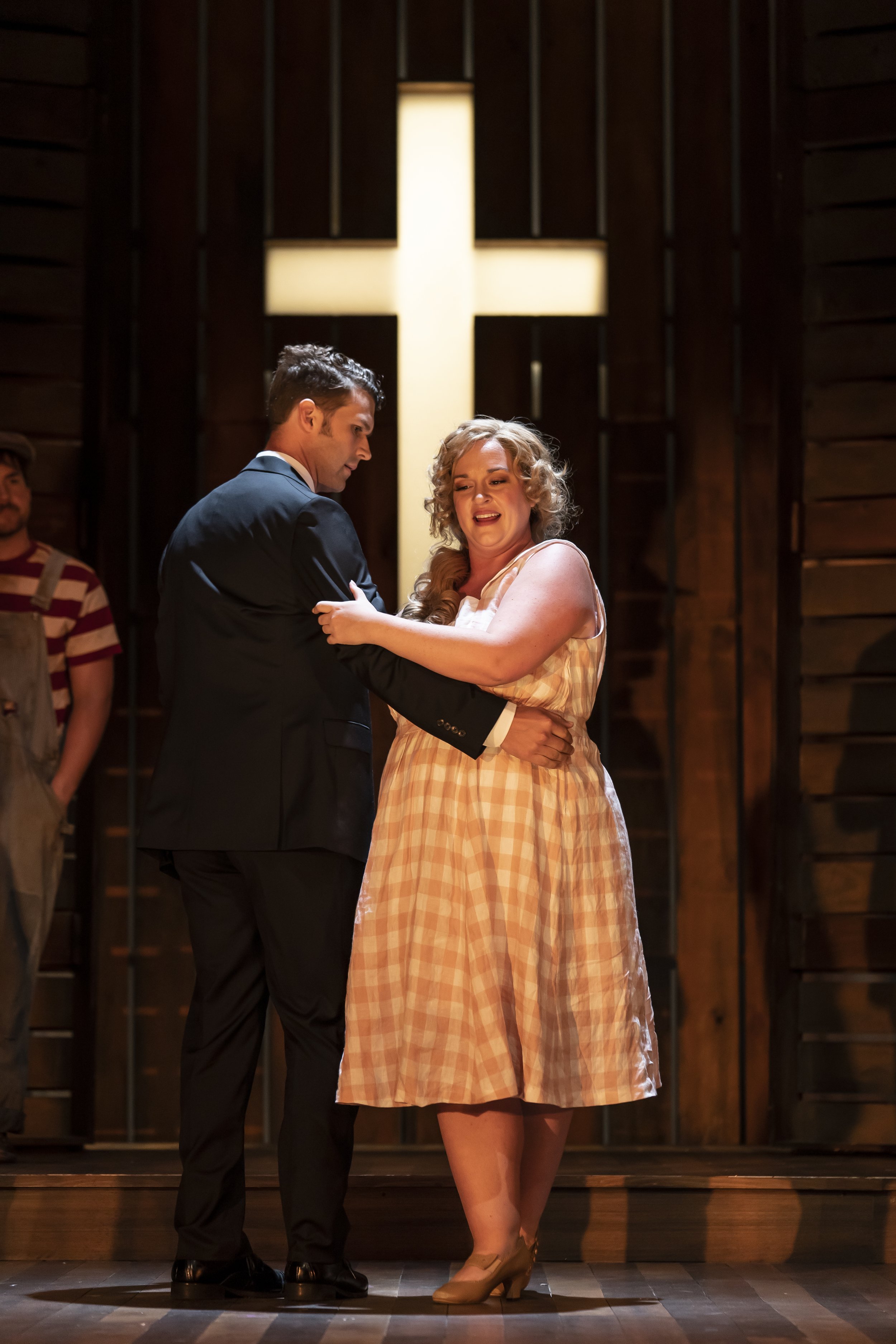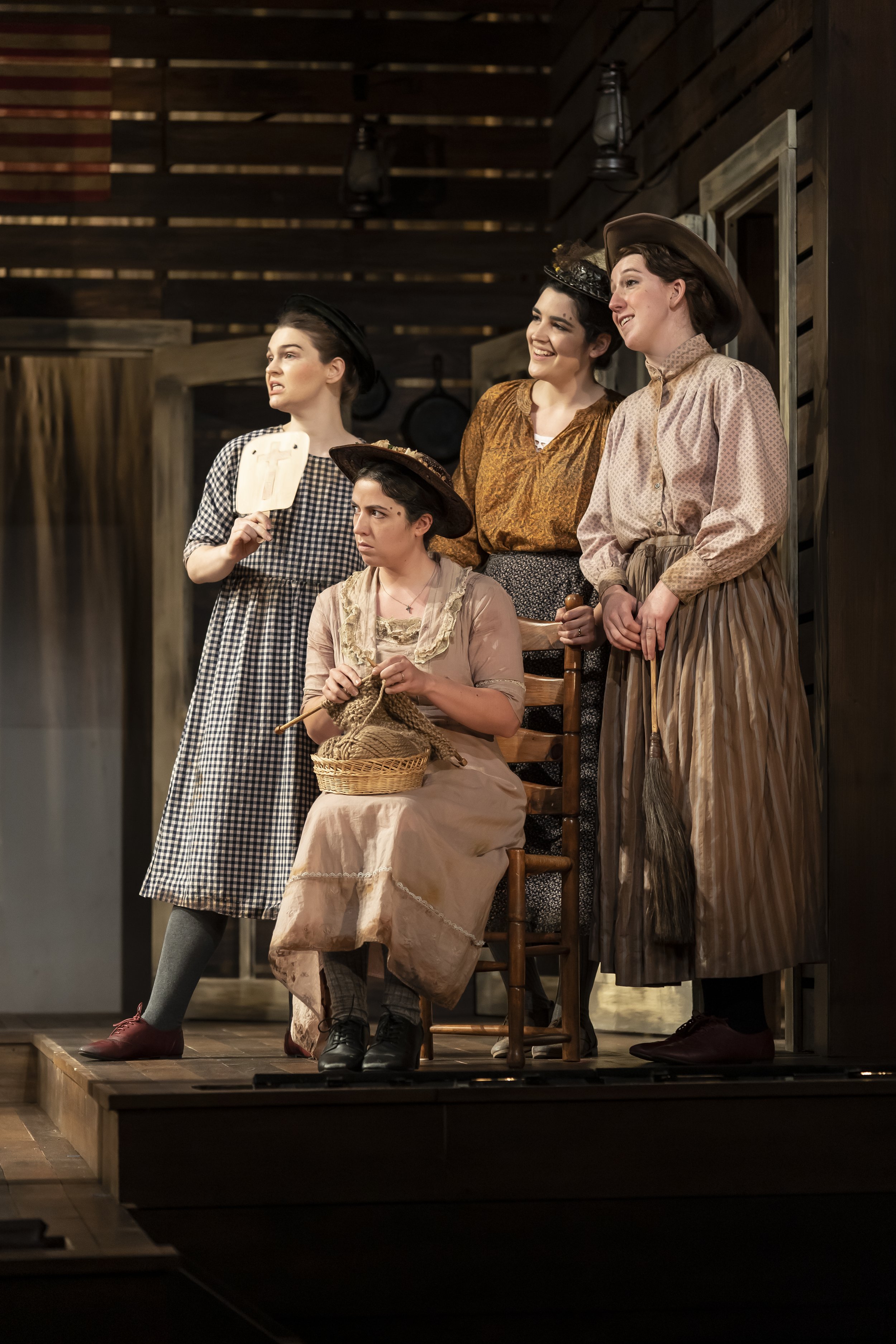I get caught up in the stories of today’s most popular operas, works from centuries ago, but the lives in those stories are typically far removed from mine. During much of Wolf Trap Opera’s performance of Carlisle Floyd’s Susannah (1955) on Friday night, I felt like a twelve-year old growing up in Georgia at one of the fundamentalist revivals I attended. Indeed, the wooden-plank set blended perfectly with The Barns’ wood construction to make the entire venue seem a country church at times, especially with the bright, lit white cross that often dominated the center of the stage. This is an American Opera, easily relatable to my life. In measure, it was my relatives on stage; I could almost taste the potato salad and banana pudding at the church social, and its themes rang true.
The composer Carlisle Floyd, experienced in piano composition and creative writing, chose to be his own librettist. He was raised in the south in South Carolina. His mother gave him piano lessons and encouraged him to write short stories. His father was a Methodist minister, and the composer-to-be attended many revival meetings where traveling charismatic preachers used inflamed and compelling dramatics in calling sinners to the alter to repent their sins and receive salvation. Susannah reflects that upbringing. Mr. Floyd’s music, tailored to support theatrical productions, includes folk songs, hymns, and dances. With his compositions, Mr. Floyd sought to develop a popular form of high quality musical theater to fit the middle ground between commercial works with a broad audience and elitist high art with its small following, and to bring it under the tent of works doable by smaller companies and college music departments, where resources are more limited, but the willingness to take chances is greater. Susannah was his most successful opera, receiving over 200 productions thus far; among American operas, second only to Gershwin’s Porgy and Bess. The composer died in 2021 at the age of 95. I highly recommend critic Tim Page’s excellent obituary in the Washington Post.
Susannah (Ann Toomey, in the right foreground) has some innocent fun at the church square dance, while Elder McLean (Tshegofatso Clement Batoyi, farther to the right) observes. Photo by Scott Suchman; courtesy of Wolf Trap Opera.
The story of Mr. Floyd’s Susannah is loosely based on the story of Susanna and the Elders in the Book of Daniel. However, in the bible story, the prophet Daniel comes to the rescue of Susanna, which is not the ending of composer Floyd’s work. Susannah Polk is an 18-year-old girl in a rural Appalachian region of Tennessee where she lives with her older brother Sam. Sam cares deeply about his sister but spends his time fishing and hunting in the day and drinking too much in the evening. Susannah has become an attractive young woman, a free spirit seeking innocent fun, but attracting the leering attention of the men and the jealousy of the women in the tight knit community. Reverend Olin Blitch is about to arrive in town to lead a revival. The community’s tolerance of Susannah ends when town elders, seeking a spot for baptisms to be performed by Blitch, spot Susannah bathing naked in a creek near her house in the woods. Their lustful impulses quickly turn to shame at her perceived outrageous behavior. They inform the other people in the community and force Little Bat McLean to say that his only real friend, Susannah, seduced him, which causes the community to refuse Susanna attendance at community events. The situation continues to spiral downhill as Reverend Blitch, failing to “save” Susannah who maintains her innocence, forces himself on her sexually. Sam shoots the Reverend, and the townspeople storm towards Susannah’s house demanding she leave the area. Susannah, crushed and worn out by the constant rejection and Blitch’s sexual abuse, makes a stand, refusing to leave, and brandishing a rifle, drives her oppressors away.
left photo: Reverend Blitch (Christian Pursell) chooses to dance with Susannah (Ann Toomey). right photo: Mrs. McLean (Winona Martin, seated), Mrs. Gleaton (Sophia Hunt), Mrs. Ott (Cecelia McKinley), and Mrs. Hayes (Hayley Maloney) observe and criticize Susannah’s behavior. Photos by Scott Suchman; courtesy of Wolf Trap Opera.
As powerful as the story is and WTO’s telling of it was, it was the music that most impressed me. When my attention occasionally shifted to the music, my response consistently was, “Wow, this music is really good.” Conductor Stephanie Rhodes Russell led a 38-piece Wolf Trap Orchestra, placed behind the stage which had been extended towards the audience over the Barn’s orchestra pit. The sound was excellent; kudos to Ms. Russell and her orchestra. Floyd’s music is melodious and colorful in orchestration, but to me its most impressive aspect was how closely attuned to the drama it was, such as a bit of dissonance blending into the current melody as a scene becomes confrontational. The music is also filled with gentle accents with solo instruments. NY critics did not embrace Mr. Floyd’s opera, criticizing it as lacking innovation and complexity. I found its beauty, drama, and the directness with which it speaks to the human heart to be more than enough. Seeing Susannah and hearing its music made me interested in attending other operas by Mr. Floyd.
Little Bat (Joseph Leppek) and Susannah (Ann Toomey) share a moment of friendship. Photo by Scott Suchman; courtesy of Wolf Trap Opera.
A highlight of any Wolf Trap Opera is the extraordinary talent and high energy of Filene Artists and Studio Artists that it attracts to its training program each summer. Lee Anne Myslewski, Vice President of Opera and Classical Programming, stated in her online pre-opera talk that the operas this year that were selected had fewer main performers to give the Filene Artists meatier roles since their career development had been interrupted by the COVID pandemic. She also said she now felt comfortable with this crop of Studio Artists handling the roles of the older townspeople, making Susannah a good choice. WTO always selects it operas after finalizing its list of successful competitors to spend a summer with WTO.
Reverend Blitch (Christian Pursell) calls on Susannah (Ann Toomey) to come forward to confess her sins and repent. Photo by Scott Suchman; courtesy of Wolf Trap Opera.
One must begin with the excellent performance by soprano Ann Toomey as Susannah. She displayed a lovely timbre in sections where a softer folk song voice was called for and great power and agility in reaching the high, emotionally intense, operatic sound that her arias often rose to. Her “Trees on the Mountain” and “Ain’t It a Pretty Night” arias were the highlights expected. Her acting fully supported Susannah’s transformation from innocent young girl to an embittered, distraught outcast from her community, while yet remaining true to herself. Christian Pursell who portrayed Reverend Blitch is an outstanding bass-baritone who sang beautifully, but in this role also had challenging dramatic demands. He met the demands both as the charismatic preacher and as the contrite sinner who had forced himself on Susannah. Tenor Robert Stahley sang the role of Sam, who might have been my favorite character. He sang the bouncy, fun “Jaybird” and more soulful arias with equal aplomb; his aria “It’s About the Way People Are Made” was especially touching. His portrayal of a country boy was convincing, and he came across as perhaps the most Christian-like member of the community before his rage takes over. He tries to console Susannah and sings about there being “too little loving kindness. It must make the good Lord sad”. Bass Joseph Leppek also gave a convincing performance singing and acting as Little Bat, who cared about Susannah but could not defy his manipulating parents.
Susannah (Ann Toomey) wards off the angry townspeople, led by Elder McLean (Tshegofatso Clement Baloyi), who demand she leave the area. Photo by Scott Suchman; courtesy of Wolf Trap Opera.
The Studio Artists in supporting roles (Tshegofatso Clement Baloyi, Tavon Walker, Hayden Smith, Dylan Gregg, Winona Martin, Sophia Hunt, Hayley Maloney, and Cecelia McKinley) contributed to the effectiveness of the story telling as Elders and their wives. Considerable acting skills were required of them, especially in the dramatic revival scene. I will single out two for special comment. Mezzo-soprano Winona Martin who portrayed Ms. Mclean was very convincing as the small town busybody who sought to manipulate everyone and kept the pot stirred against Susannah. Her counterpart as Mr. McLean was baritone Tshegofatso Clement Baloyi who seemed to anchor the performances of the townspeople. Both were excellent.
In the final scene, Susannah (Ann Toomey), embittered by a life in ruins, rejects Little Bat’s (Joseph Leppek) pleas for forgiveness. Photo by Scott Suchman; courtesy of Wolf Trap Opera.
Director Dan Wallace Miller told the story well and kept the action flowing smoothly for the most part. In a move that surprised me, he highlighted Susannah’s loss of innocence in the final scene by having her give Little Bat a blow with the butt of her rifle, refusing his pleas for forgiveness, jolting as well as effective. The dialect selected was rustic and unobtrusive, though not southern. The least effective scene in the production was the Susannah bathing scene where Susannah was placed off stage. The possibilities for this scene were constrained by having a single set that covered the entire stage. The audience was required to extend its sense of disbelief in several scenes, but it mattered in the bathing scene, and for me, it was distracting and muddled the motives of the Elders. The set design by Christopher Mumaw was most effective when displaying the church scenes. Marnie Cumings lighting design helped the transitions between scenes. Special kudos to costume designer Candace Frank and hair & makeup designer Anne Nesmith who made the costumes and the period and place entirely believable, a highlight of the opera. Choreographer Felicity Stiverson made the dancing at the social and the interactions between the Reverend and Susannah go smoothly.
I would like to close with something that was not in the opera. It was in the pre-opera talk by Ms. Myslewski. Mr. Floyd’s opera is an indictment of the destruction caused by the coercive power of groups. In her comments, without excusing the cruel and small-minded behavior of the townspeople, she points out the importance of community in those circumstances. These people were poor and needed each other, depended on each other for survival. A code of conduct was necessary to ensure the effective functioning of the community. Human flaws and weaknesses caused it to go awry. Susannah tells the tale of a tragedy for all of its characters. Sam’s assertion that the world needs more loving kindness for everyone feels about right.
The Fan Experience: Susannah was scheduled for performances on August 12, 14, and 20. The opera is in English with supertitles on a screen above the stage. The performance is two hours with an additional 20-minute intermission between acts. This production appears to be a sell out; I was unable to find any remaining tickets online. Ms. Myslewski’s excellent pre-opera talk should be available online until the August 20 performance.
The Barns is an excellent venue for opera, intimate with good acoustics. Even the seats at the back and in the balcony are relatively close to the performers, but some of those in the back on the floor lack a view of the supertitles. The floor seats are not tiered but those in the balcony are. Food and beverages are available before the performances and during intermissions. During DC’s hot and humid summers, it has excellent air-conditioning. Parking is free, plentiful and is easy-in/easy-out.







